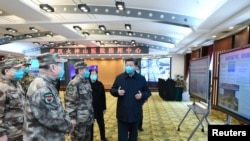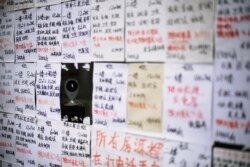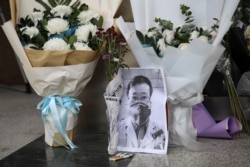As Xi Jinping toured the coronavirus-stricken city of Wuhan this week, setting the tone for an official narrative that China will win a "People's War," numerous social media users went to extraordinary lengths to make an alternative voice heard.
The effort to get around China's censors and publish the words of Wuhan doctor Ai Fen, the first to sound the alarm about the virus, was among the most elaborate in an outpouring of dissent against the government narrative as the outbreak exacts a devastating human and economic toll.
In a bid to fool censors' artificial intelligence software, netizens translated an interview with Ai, head of the emergency room at Wuhan Central Hospital, into at least five languages and reformatted it in at least 22 ways.
The text was rendered backward, into emojis, Braille, oracle bone script, Morse code, song sheets and even the Elvish language from Lord of the Rings.
"The scale and intensity of the pushback against propaganda during this virus outbreak is unprecedented," said Zhan Jiang, a media professor at Beijing Foreign Studies University.
"To some extent, the '404 system' has collapsed temporarily," he told Reuters, referring to the error message that appears when content has been moved or deleted. "It will bounce back into this seesaw game with the netizens."
Tighter lid
Under Xi, censorship has steadily tightened. Alfred Wu, an associate professor at the National University of Singapore's Lee Kuan Yew School of Public Policy, expects that to continue after the virus outbreak.
"Aware that many are unhappy, it is in the nature of the party to adopt the strategy of offense as defense," he said, referring to the ruling Communist Party.
The Cyberspace Administration of China, the country's internet regulator, did not reply to a request for comment.
Xi acknowledged the suffering of those infected or forced to stay at home when he visited Wuhan.
"People under lengthy quarantine have some frustrations to vent," which should be understood and tolerated, state television cited him as saying.
In the article that was repeatedly deleted and reposted, Ai recounted how instead of taking early precautions after she warned others about the virus, the hospital chastised her for spreading rumours and causing panic — part of the suppression of early information that exacerbated the spread of the virus, officially named SARS-CoV-2.
"Had I known how things would turn out, I wouldn't care if I got criticized. I would've told the whole world," Ai, who has lost patients and colleagues to the novel coronavirus, said in the interview with Chinese magazine People, giving a grim account of deaths and the strain on medical staff.
Neither Ai nor a hospital representative could immediately be reached for comment.
'Decisive battle'
Xi, who was conspicuously absent from state media coverage in the outbreak's early days, has become the face of the virus fight. After his Wuhan visit, state news outlet Xinhua posted a video, The People's Leader commanding the decisive battle.
There is little sign that Xi has been politically weakened by the outbreak. Indeed, the worsening global pandemic makes China's response look effective, strengthening Beijing's official narrative.
After Xi visited a Wuhan hospital and stood in front of a red banner that said, "Resolutely winning the people's war," Fang Fang, a Wuhan novelist who has gained a following by posting diary entries about life in a city under lockdown, wrote: "Remember, there is no win, only an end."
Fang's postings are often scrubbed from social media, but her blog is intact on Caixin, an independent media outlet, where each entry gets tens of thousands of reads.
The death from coronavirus last month of Li Wenliang, a doctor from the same Wuhan hospital and one of the eight given a police warning for circulating Ai's message about the disease, triggered a rare outpouring of outrage against authorities. The government ended up honoring Li among more than 500 "model health care workers."
"A healthy society should have more than one voice," Li said in a Caixin interview before his death from the virus, in what became a rallying cry for free speech among Chinese netizens.
Last week, a rare view of public anger involving a top central official went viral: A video clip showed residents of a Wuhan apartment complex accusing employees of staging the delivery of groceries to impress a high-level inspection tour, jeering, "It's fake!"
Last Friday, Wuhan party secretary Wang Zhonglin's launch of a "gratitude education" campaign asking residents to be thankful to Xi and the party triggered backlash.
"Anyone with a conscience would not demand the people of Wuhan, still reeling from shock, to be grateful," commentator Chu Zhaoxin said in a WeChat article that went viral.
The official newspaper article announcing Wang's campaign was later removed.







